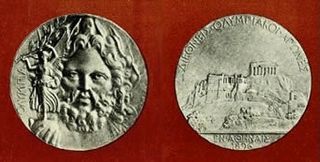
The 1900 Summer Olympics, today officially known as the Games of the II Olympiad and also known as Paris 1900, were an international multi-sport event that took place in Paris, France, from 14 May to 28 October 1900. No opening or closing ceremonies were held.

A spelling bee is a competition in which contestants are asked to spell a broad selection of words, usually with a varying degree of difficulty. To compete, contestants must memorize the spellings of words as written in dictionaries, and recite them accordingly.

The Panathenaic Games were held every four years in Athens in Ancient Greece from 566 BC to the 3rd century AD. These Games incorporated religious festival, ceremony, athletic competitions, and cultural events hosted within a stadium.

A medal or medallion is a small portable artistic object, a thin disc, normally of metal, carrying a design, usually on both sides. They typically have a commemorative purpose of some kind, and many are presented as awards. They may be intended to be worn, suspended from clothing or jewellery in some way, although this has not always been the case. They may be struck like a coin by dies or die-cast in a mould.

A gold medal is a medal awarded for highest achievement in a non-military field. Its name derives from the use of at least a fraction of gold in form of plating or alloying in its manufacture.

A silver medal, in sports and other similar areas involving competition, is a medal made of, or plated with, silver awarded to the second-place finisher, or runner-up, of contests or competitions such as the Olympic Games, Commonwealth Games, etc. The outright winner receives a gold medal and the third place a bronze medal. More generally, silver is traditionally a metal sometimes used for all types of high-quality medals, including artistic ones.

American Gladiators is an American competition television program that aired weekly in syndication from September 1989 to May 1996. The series matched a cast of amateur athletes against each other, as well as against the show's own "gladiators", in contests of strength and agility. Following the success of American Gladiators, other countries began to produce their own versions of the show.

Idol is a reality television singing competition format created by British television producer Simon Fuller and developed by Fremantle. The format began in 2001 with the British television series Pop Idol; its first adaptation was the South African series Idols in 2002. It has since become the world's most widely watched television franchise, as well as one of the most successful entertainment formats, adapted in over 56 regions around the world, with its various versions broadcast to 150 countries with a worldwide audience of roughly 3.2 billion people. The franchise has generated more than $2.5 billion in revenue.

In team sport, a player of the match award is often given to the most outstanding player in a particular match. This can be a player from either team, although the player is generally chosen from the winning team.

In the United States, a sweepstake is a type of contest where a prize or prizes may be awarded to a winner or winners. Sweepstakes began as a form of lottery that were tied to products sold. In response, the FCC and FTC refined U.S. broadcasting laws. Under these laws sweepstakes became strictly "No purchase necessary to enter or win" and "A purchase will not increase your chances of winning", especially since many sweepstakes companies skirted the law by stating only "no purchase necessary to enter", removing the consideration to stop abuse of sweepstakes. Today, sweepstakes in the United States are used as marketing promotions to reward existing consumers and to draw attention to a product. By definition, the winner is determined by pure random chance rather than skill.
In games and sport, a tiebreaker or tiebreak is used to determine a winner from among players or teams when their scores are tied at the end of a contest, or a set of contests. In some sports, it is known as a countback.
A magic convention is a gathering of professional magicians, magical hobbyists, dealers, collectors of magical apparatus, books and ephemera, and other students of the art of magic. It provides a place for lectures of subjects related to the craft, as well as a series of sample performances of noted or innovative techniques. Many conventions also hold competitions to judge who excels at a particular style, and present awards in various categories such as sleight of hand, card tricks, mentalism, and stage illusions. The largest magic convention is The Blackpool Magician's Convention which is attended by over 3,500 magicians.
An inducement prize contest (IPC) is a competition that awards a cash prize for the accomplishment of a feat, usually of engineering. IPCs are typically designed to extend the limits of human ability. Some of the most famous IPCs include the Longitude prize (1714–1765), the Orteig Prize (1919–1927) and prizes from enterprises such as Challenge Works and the X Prize Foundation.
A superstar is someone who has great popular appeal and is widely known, prominent, or successful in their field. Celebrities referred to as "superstars" may include individuals who work as actors, musicians, athletes, and other media-based professions.

The final of a competition is the match or round in which the winner of the entire event is decided.
The Netflix Prize was an open competition for the best collaborative filtering algorithm to predict user ratings for films, based on previous ratings without any other information about the users or films, i.e. without the users being identified except by numbers assigned for the contest.
There are a number of competitions and prizes to promote research in artificial intelligence.

This list is an alphabetical glossary of Australian rules football terms, jargon and slang. While some of these entries are shared with other sports, Australian rules football has developed a unique and rich terminology.
A juried competition is a competition in which participants' work is judged by a person or panel of persons convened specifically to judge the participants' efforts. The jury may be referred to as a competition jury or awards jury, and usually presents awards based on specific criteria for the competition.

An award, sometimes called a distinction, is given to a recipient as a token of recognition of excellence in a certain field. When the token is a medal, ribbon or other item designed for wearing, it is known as a decoration.

















